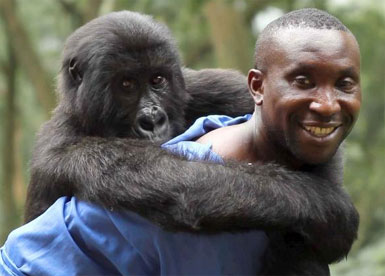More great news for the world’s remaining wild areas:
Soco International announced it will stop exploring for oil in Democratic Republic of Congo’s oldest national park, Virunga National Park. It also says it will stay clear of all UNESCO World Heritage Sites, which Shell has also promised.
Incredibly, the government has allocated oil concessions in 85% of the park, but Soco is the only company that’s acted so far. Total pulled out of Virunga last year. UNESCO is calling on the government to cancel all oil concessions that impact the park.
Virunga is home to more than half the world’s critically endangered mountain gorillas (remember the movie, Gorillas in the Mist?) and is one of the prime biodiversity hotspots in the world. More than 50,000 families depend on it for drinking water, food and jobs – it has the potential to provide $400 million a year in revenue from ecotourism and sustainable fisheries.
The forest is under more than enough pressure from violence that’s plagued the country for years and organized crime’s illegal logging.
A park ranger with an orphaned gorilla:

Credit: Orlando von Einsiedel
Last month, the government announced it is embarking on a "massive green development program" that will protect its forests through the sale of carbon credits.
There are wider issues associated with this situation: Why would an oil company want to drill there in the first place? It’s another illustration of the end of "easy oil," says Mark Campanale, co-founder of Carbon Tracker. "All the new oil is difficult to access – it’s in places like the Arctic or rainforests. Companies are having to go to greater and greater extremes to find ever-smaller amounts of oil."
And these days, investors are watching. Aviva, which has a policy on socially responsible investing says, "Operating in a World Heritage Site is obviously a very serious issue and we are prepared to be pretty robust about it. We have been speaking to the company about the fact that this is a big issue for us," says Stephanie Maier, head of corporate responsibility.
In October 2013, World Wildlife Fund (WWF) set a precedent by using OECD guidelines to protect the environment. It filed a formal complaint alleging Soco violated OECD’s guidelines for multinationals operating abroad. The company’s announcement follows mediation between the two parties.
WWF plans to expand this effort to work with governments and businesses to remove similarly increasing pressures at other World Heritage Sites.
Will this extend to Ecuador’s Yasuni National Park?
